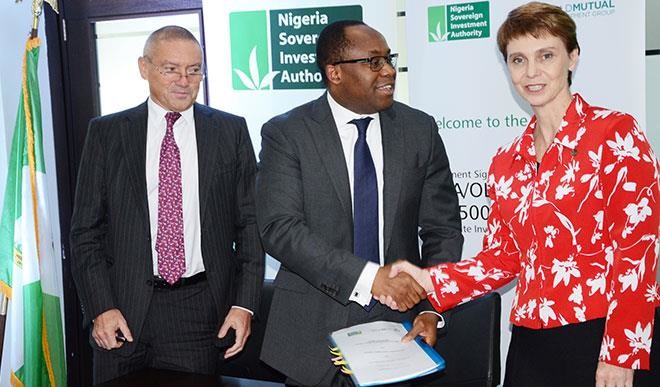
EDCIO Nigeria Sovereign Investment Authority, Hanspeter Ackermann; MDCEO, NSIA, Uche Orji; and CEO, Old Mutual Investment Group, Diane Radley, at the agreement-signing ceremony in Abuja on Friday.
Nigeria’s quest to diversify its economy from oil and growing agriculture seems to be gathering momentum as the Nigeria Sovereign Investment Authority (NSIA) has signed an agreement with Old Mutual Investment Group (OMIG) of South Africa, and African Agri-Investments (UFF) Agri-Fund for the establishment of a $200 million agriculture co-investment vehicle.
The investment focus of the agreement is primary production, processing, and logistics. The vehicle is expected to have an important social investment component, investing in rural development, food security, import substitution, and other areas within the sector beneficial to Nigerians.
Government’s dependence on oil for bulk of its revenue over the years meant that agriculture, which was the country’s mainstay, was relegated to the background. Yet, agriculture has remained a major contributor to Nigeria’s Gross Domestic Product and an employer of more than 50 per cent of the country’s workforce.
With about 84 million hectares of arable land, according to the Federal Ministry of Agriculture and Rural Development, Nigeria’s agricultural potential is huge.
However, several challenges particularly in the areas of transporting produce from farm to buyers, storage and processing have plagued the agricultural sector.
The aspect of processing seems to be of greatest concern in the sector as post-harvest losses have been the major challenge to the nation’s farming subsector.
Absence of effective processing facilities has always led to wastages in the farming produce nationwide and this is part of the problems the new investment plan seems to address.
There has been little or no intervention in this sector, which has made agriculture moribund or at least unattractive to the teeming youth in the country.
And with oil fortune waning world-wide, many youths become unemployed as a result of the economic consequences on the country. This is forcing governments at all levels to be turning into agriculture.
Comments from the Finance Minister, Mrs Kemi Adeosun, at the agreement signing ceremony in Abuja strongly indicated that developing agriculture is very critical in the country’s bid to diversify the economy and to do that we need to invest heavily in infrastructure.
NSIA, which is the manager of Nigeria’s Sovereign Wealth Fund, and the other partners have agreed to make commitments for an initial investment of $50 million ahead of the targeted $200 million.
The aim of the agreement was to improve Nigeria’s food security and promote rural economic development to capitalize on the growing opportunities that the Nigerian agricultural industry provides.
NSIA’s commitment to the course is $25m, with matching capital from Old Mutual bringing the first close to $50m. Additional capital of $150m is then expected to be raised from third party investors, bringing the investment vehicle to a final close of $200m.
Analysts believe that such initiative by the NSIA would assist farmers and other agricultural workers in their production process as the initiative seeks to invest heavily on agricultural infrastructure including those bordering on production.
Processing of agricultural produce, which the agreement is heavily inclined to, will address the challenge of post-harvest loss being experienced by farmers in the country.
This is timely as farmers are already raising concerns about post-harvest loss of perishable produce like tomatoes in the country.
The Benue State Chairman of the All Farmers Association of Nigeria (AFAN), Aondona Hembe Kule, speaking in Makurdi, said that the federal government ought to have, by now, researched on how to effectively store tomatoes to avoid spoilage.
These are some of the challenges the new initiative by the NSIA tends to address. And of course, if the multi-million dollars agreement succeeds, the agricultural sector, which has the capacity to employ the largest numbers of people, will be opened up and the menace of unemployment will be drastically reduced.
To assure the seriousness of the initiative, the managing Director/CEO, NSIA, Uche Orji, said at the signing ceremony, that the agriculture vehicle will be configured to address the economic imperatives of population growth and enhancement of food security and wealth creation.
Orji said: “The NSIA will continue to serve as a catalyst for private sector involvement in key sectors of the economy by exploring partnerships with credible entities such as Old Mutual Investment Group and UFF Agri-Fund.”
OMIG’s CEO, Ms. Diane Radley, noted that the partnership with NSIA is a critical step in the development of OMIG’s commercial agriculture strategies in Africa.
The NSIA is a corporate body established by the Nigeria Sovereign Investment Authority (Establishment, etc.) Act of 2011.
Source: Daily Trust
